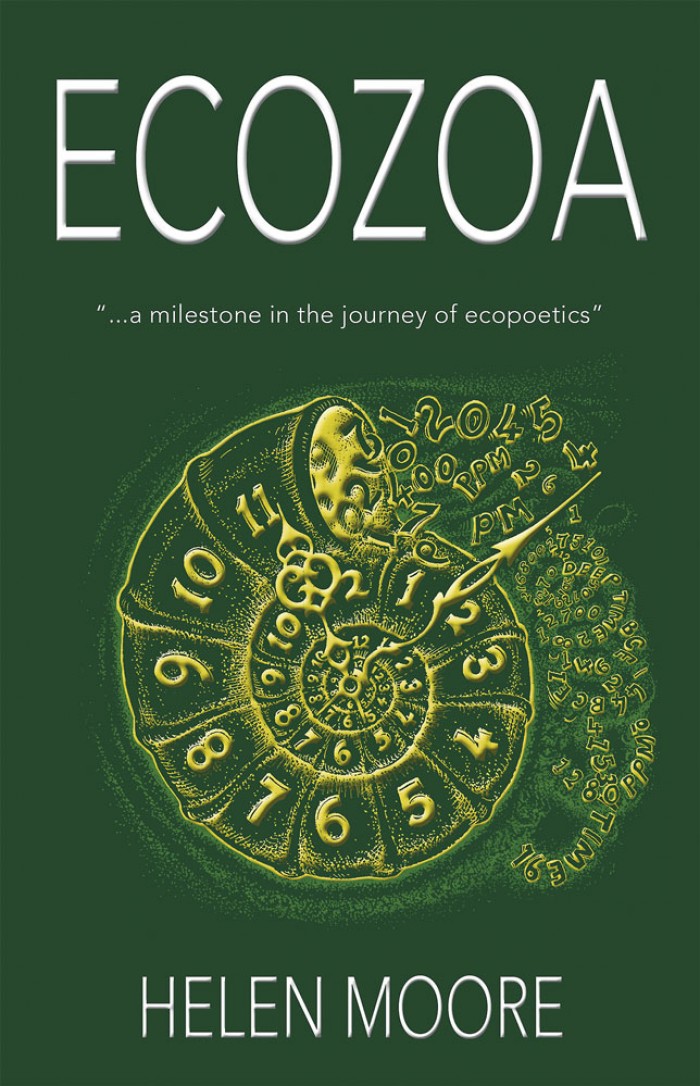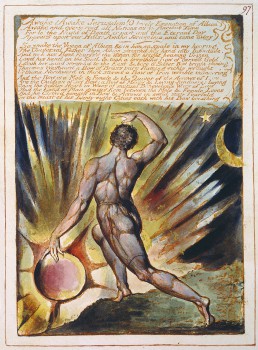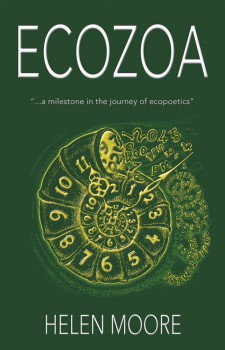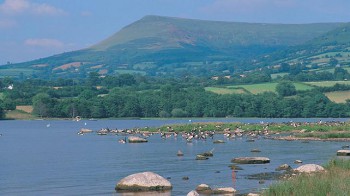
Review: Helen Moore, Ecozoa (Hampshire: Permanent Publications, 2015)
O, obscene era
this is an emergency!
(‘Deep Time, Deep Tissue’)
There’s no mistaking the message articulated by Helen Moore in her new collection of eco-poetry.
Already in 2012’s Hedge Fund she was warning of the existential threat to our natural world at the same time as marvelling at its delights.
But three years later, with Ecozoa, there is the impression of a still sharper edge to her vision, perhaps in response to yet more sharply-cut wounds inflicted by the murderous mutilating monster known as industrial civilization.

What has changed over that period? For a start, Moore’s English homelands have been threatened by fracking, a process which is so blatantly unacceptable that it reveals itself and the mindset behind it as an assault not just on our soil, air and water but on all good sense, on any vision of a future place worth living in.
earth is not our wider, life-sustaining body
but a cache of raw matter to be stripped, mined, fracked
(‘apples are not the only gadgets’)
There are poems here reflecting her own participation in (‘This is not a dirty protest!’) and support for the anti-fracking struggle. “And may the frackers’ drills go soft, their stocks & shares evaporate!” she prays in ‘I call on the spirit of Owen’.
Moore is scathing about those who bear responsibility for the destruction of our planetary life-support system, “the kind of chaff that congregates out of sight of the general public – like arms dealers, corporate lobbyists & government ministers”. (‘The Pocket’s Circumference).
In ‘Kali Exorcism’, a Ginsberg-inspired piece, she unleashes her moral scorn for those leaders of our society who dare to proclaim their moral high ground from the darkest depths of a stinking corpse-filled pit of hypocrisy.
then show us the hands of our prime minister and his henchmen
in the pockets of BAE Systems, touting for business
with morbid regimes and crackpot dictators,
and their arms fairs, where they never ask what’s fair
in selling arms, just rake in the bloodied money,
as our own banks account to cluster-bomb makers.
Come, dark goddess, tear off veils of rhetoric that conceal
war-mongering deeds in cloaks of respectability: help us
hear deeper than the pre-emptive strikes, the collateral damage
ventriloquised by our complicit media,
and demand plain language to describe victims of torture,
rape and murder in the wars they report.
At the same time, she sings sublime songs of praise to all that she loves, such as in the beautifully simple poem ‘glory be to Gaia’:
glory be to Gaia,
for birdsong, mountains and clear lakes;
we honour & praise you, Gaia,
giant pulsating orb of life
from which we’ve grown –
please help us feel our interdependence
with all animal and human kin
I may be doing Moore a disservice by drawing attention to the poems that most directly express a ‘political’ message – there are plenty in the collection that concern other aspects of her life.
But for me, that is where the power in her work resides – not just in her expression of a message, but in her awareness of how important it is that this message be expressed, and in her acceptance of the responsibility that she bears to help express it.
This is perhaps something that has started to grow much more strongly within her, like an idea-child, in recent years, as she hints in ‘Sweet Pain’:
So I’ve chosen to embrace
different responsibilities – to journey through
my wounds to serve The Great Turning.
Now let revolutionary love suckle
at my breast – the desire’s been growing
As she explains in her ‘Notes’ at the end of the collection, the term “The Great Turning”, popularised by Joanna Macy and David Korten, describes “the movement from an industrial-growth society to a life-sustaining one”.
The book’s title comes from Thomas Berry’s proposal of an “Ecozoic Era”, denoting a new age where we live in harmony and “with the Earth as our community”.

But an even more important presence in this book is that of William Blake (1757-1827). He also partly inspired its title, with his work The Four Zoas, and figures from his own personal poetic mythology – Tharmas, Urizen, Urthona and Luvah – here feature as headings for the sections of the collection.
Blake in many ways provides a bridge from the ancient world to the new. Historian Christopher Hill has written that he detects an inspiration for Blake’s Romantic vision in “an underground heretical tradition which influenced his thought in a communitarian and chiliastic direction”, which had been passed down by the “mystical anarchists” of the millenarian sects of the Middle Ages, especially the Brethren of the Free Spirit, via the English Revolution (for more on this see The Stifled Soul of Humankind).

Blake’s spirit – “a kind of pantheistic idealism” to use a label deployed by anarchist writer Peter Marshall – resurfaced to dramatic effect at the end of the 19th century but has been somewhat crushed by the machineries and microchips of the 20th and early 21st centuries.
By placing herself in a direct line of ideological descent from Blake, Moore is doing more than expressing admiration for him. She is proclaiming herself as a contemporary manifestation of that same “underground heretical tradition”.
Of course, like all watery things, this stream of thought is not easy to pin down or define and in Moore it takes on a new shape, appropriate to our age and influenced by contemporary environmentalism and feminism – as well as by the very experience of living in these disastrously dislocated and disintegrating times.
However, it is clear to me that Moore is very consciously invoking, summoning up, the spirit that animated Blake, his predecessors and his successors – bringing it into existence in our midst, in England, in 2015, so that it can inspire once more.
She cites Thomas Berry as saying that that the Ecozoic Era is something that “we must will into being”, and in doing so she reveals that her chosen task is to help to do just that.
For we are too deeply buried now in layers of deepest delusion, deception and despotism for our salvation to come through straightforward means. It is becoming increasingly impossible for people to even imagine a world that is not choked by the capitalist cancer, let alone begin to create one.
Something more than narrow rationality is needed to snap us out of our sleepwalk towards the cliff edge. Something powerful and magical – something poetical! – needs to surge out of our dreams, out of our collective soul, something that can break the hypnotic spell and bring humankind to its waking senses.
Yes, “this is an emergency” – and an emergency to which Helen Moore for one is clearly prepared to respond.
(Information on readings and other launch events can be found here)




Hi Paul, what a GREAT review, really well written and yeah you bring out one of the most dramatic sides of this collection, its call of which side of the line in the sand, or soil, are you on? Time IS short and obviously now becoming shorter and we (people) and we poets and we environmentalists have a writer, a brilliant writer, who is out there and important at a time when others need to step up? Helen appears at the Barbican, London this weekend, reading from this collection. Unmissable? I should say: http://www.permaculture.co.uk/events/universe-story-event
Tony